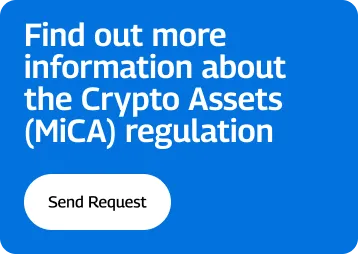
MiCA Regulation and licensing requirements
Last Update: 09.02.2025
The Markets in Crypto-Assets Act, or MiCA is the first and only legislation of its kind in EU, setting a new standard for crypto asset regulation. We recommend to receive a legal advice in regards of any questions related to MiCA regulation, requirements and the licensing process.
As of 30 June 2024, the first measures of the MiCA Regulation (‘Cryptoasset Markets’), which introduce a single legal framework in the EU for the issuance of cryptoassets and related services, are already in force These measures relate to:
- Asset-referenced tokens (Title III): they must be backed by appropriate reserves to maintain their stability and there’s specific requirements for issuers of such tokens.
- E-money tokens (Title IV): they are regulated as digital analogues of fiat currencies, requiring strict reserve and stability requirements.
The remaining measures will come into force in December 2024 and will cover:
- Regulation of other types of cryptoassets.
- Licensing of cryptoasset service providers.
- Ensuring transparency and investor protection (incl. restriction on market manipulation, etc.).
This will create a complete legal framework for the functioning of the cryptocurrency market in the EU, enhancing its security and confidence in digital assets.
MiCA establishes EU-wide framework for crypto-assets service providers (also known as crypto-assets service providers – CASPs) and crypto assets (also known as virtual currencies or cryptocurrencies). It covers issue rules for certain crypto assets, including virtual currencies backed by fiat currencies or other assets, and e-money based on distributed ledger (blockchain) technology.
Regulation established continues the approach chosen by EU to fit for the digital age and contributes to a future-ready economy that works for the people, including by enabling the use of innovative technologies. Crypto assets will play significant role in the further capital-raising processes, by provision of innovative way of financing for enterprises and ideas. There’s also important role of crypto assets as means of payments, due to options to build cheaper, faster and more efficient systems for value transfer (incl. cross-border transfers) with lesser involvement of intermediaries. MiCA also shall stimulate companies working in blockchain technology sector for expanding their business models and crypto-asset sector itself, which will lead to economic growth and new employment opportunities for EU citizens.

Classification of Crypto Assets
Until MiCA there was no unite approach for qualification of crypto assets in EU. Certain assets were qualified as financial instruments within the meaning of Directive 2014/65/EU of the European Parliament and of the Council, however major part of existing virtual currencies (e. g. Bitcoin, Ethereum, Litecoin, etc.) were unregulated on EU-wide level.
Number of countries in EU established local regulations, where virtual currencies are defined. Such situation would lead to lack of users’ confidence in those assets, which could significantly hinder the development of a market in those assets and may lead to missed opportunities in terms of innovative digital services alternative payment instruments or new funding sources for EU enterprises.
New MiCA regulation aims to unite approach for crypto-assets’ definitions and introduces the three types of crypto assets depending on the risks they entail. Classification is based on whether crypto-assets seek to stabilize their value by reference to other assets (incl. official currencies or certain assets, like gold, etc.) and negative definition, that all other crypto assets shall fall under another category referred as “crypto-assets”. There’s also separate definition for utility tokens, which are only intended to provide access to a good or a service supplied by the issuer of such tokens, however, there’s no difference in the approach for such tokens, except certain requirements during ICOs.
Electronic money tokens and asset-referenced tokens
Electronic money token or e-money token means a type of crypto-asset that purports to maintain a stable value by referencing to the value of one official currency. Such tokens may affect financial market and together with asset-referenced tokens require enhanced supervision.
Asset-referenced token means a type of crypto-asset that is not an electronic money token and that purports to maintain a stable value by referencing to any other value or right or a combination thereof, including one or more official currencies and/or other assets (e.g. gold or silver). Main criteria for asset-referenced tokens qualification will include analysis of mechanism for maintaining stable value in relation of certain assets and for this reason so-called algorithmic “stablecoins” will fall under new MiCA regulation.
MiCA also establishes additional requirements for e-money and asset-referenced tokens, which should be considered as “significant”, taking into account large customer base, a high market capitalization, or a high number of transactions. Such MiCA requirements will include higher capital requirements and obligation to manage liquidity according to certain standards.
If you need consultation on complying with the MiCA Regulation and operating your crypto asset business legally in the EU, please contact us!
Our Team
External IT & Compliance auditor
Master’s degree in BA
Certified Internal Auditor
(Certiticete.no. 137788)
Certified Information Systems
Auditor
(Certificate по. 242546983)
Certified DORA Manager
Senior Associate
Chiet Accountant
Ph.D. in Finance
Assets excluded from MiCA regulation
NFTs and other assets with unique characteristics
MiCAR is developed for being not applicable to crypto-assets that are unique and not fungible with other crypto-assets, including digital art and collectibles, which value is attributable to each crypto-assets’ unique characteristics and the utility it gives to the token holder. In addition, it also will not apply to crypto-assets representing services or physical assets that are unique and not fungible, such as product guarantees or real estate.
Nevertheless, MiCA regulation establishes certain requirements for issuance of NFTs: such assets shall meet “unique and not fungible” criteria, which can’t be grounded only on assigning of unique identifier. The assets or rights represented should also be unique and not fungible for the crypto-asset to be considered unique and not fungible. When assessing and classifying crypto-assets, competent authorities should adopt a substance over form approach, under which the features of the asset in question should determine the qualification, not its designation by the issuer.
Crypto-assets issued by central banks
MiCA Regulation also doesn’t apply to digital assets, which may be issued by central banks acting in their monetary authority capacity, as well as crypto-assets issued by authorities.
Non-transferable assets
MiCA will not apply also to assets, which are accepted only by the issuer and can’t be transferred to other holders directly. Examples of such assets include some loyalty schemes, where the loyalty points can be exchanged for benefits only with the issuer or offeror of these points.

MiCA requirements for issuance (ICO) of crypto-assets and their listing
MiCA regulation introduces requirements for issuers of crypto-assets where certain rules apply for specific types of crypto assets. More stricter requirements are made for e-money and asset-referenced tokens, because of greater risks their impose to the financial system.
It is also important to note, that MiCA regulation establishes requirements for crypto-assets issuers, if they exist, however requirements for services related to crypto-assets also apply to crypto-assets without issuer (like Bitcoin). In addition, issuers of crypto-assets will be not considered as entities, who are providing services related to crypto-assets in case when they only offering their customers an opportunity to exchange money or other crypto assets for tokens issued by them. Such approach will positively affect projects, which are intending to use crypto-assets as means of funding, as well as for projects where crypto assets. There’s also smoother requirements for crypto-assets offered for free and utility tokens for goods or services already existing.
Crypto-assets whitepapers
For the issue of crypto-assets (excl. asset-referenced tokens or e-money tokens) to EU market, as well for admission (listing) of crypto-assets to trading on the EU-based CASP, issuers of such assets must notify relevant authority and publish white paper, which contains mandatory information and disclosures (e.g. risks associated with this crypto-assets). Such crypto-asset white paper should contain:
- general information on the issuer;
- offeror or person seeking admission to trading;
- information on the project to be carried out with the capital raised;
- information on the public offer of crypto-assets or on their admission to trading on a trading platform for crypto-assets;
- information on the rights and obligations attached to the crypto-assets;
- information on the underlying technology used for such assets; and
- information on the related risks.
It is important to note, that MiCA requirements to issue white paper will apply only for crypto-assets which may be bought or held by unlimited number of non-qualified investors. Nevertheless, some principles of issuance remain applicable also for crypto-assets developed only for qualified investors. MiCA also establishes thresholds, allowing for start-ups and SMEs to be excluded from obligations to issue white paper within requirements established, however most of obligations related to consumer protection remain applicable. In addition, for utility tokens offerings are established limits for the duration of the public offers, in case when goods or services are not available at the moment of the offering (e.g., if ICO starts and there’s no platform or MVP created yet).
Marketing communication
Marketing communication, including advertising messages and marketing materials in newest channels, like social media platforms, should be based on fair, clear and not misleading information, which is in line with crypto-asset’ white paper.
Persons organizing ICO should act honestly, fairly and professionally and communicate in a fair, clear and truthful manner. Among other things they should identify, prevent, manage and disclose conflicts of interest and have effective administrative arrangements to ensure that their systems and security protocols meet EU standards.
Supervision by competent authorities
MiCA regulation aims to avoid undue administrative burdens when publishing whitepaper and there’s no requirement to receive approval for crypto-asset white paper before its publication. Nevertheless, regulators will be able to request amendments to the white paper and any marketing communication issued, as well as suspend or prohibit crypto-assets offering (incl. admission) or publish warnings.
European supervisory authorities (ESMA and EBA) are also mandated to publish guidelines about EU standards applicable in the field of ICO.
Safeguarding requirements and right of withdrawal
MiCA establishes certain requirements for holding of funds and crypto-assets, acquired in the course of ICO, to ensure that collected assets may be returned. It is offered to use third parties for safeguard such funds and crypto-assets.
For ensuring better protection of retail investors, new MiCA regulation requires to give them right to withdrawal during a limited period of time after their acquisition. Nevertheless, in certain cases (e.g. when ICO is organized through trading platform) such requirements would be not applicable.
Issuance of asset-referenced tokens
For issuance of asset-referenced tokens, such issuer should have registered office in the EU and authorisation by supervisory authority is required (if tokens will be offered to retail investors or with exceeding certain threshold), as well as approval of crypto-asset whitepaper. In addition to this, MiCA gives mandate to ECB for assessment and placing restrictive measures for issuance certain tokens, if such activity may affect EU’s financial system stability.
In addition to white paper, issuers of asset-referenced tokens should provide their tokens holders information on continuous basis, and it should include amount of asset-referenced tokens in circulation and the value and the composition of the reserve assets. Such information should be provided on the website, as well as information about any event, which may have impact on value of tokens or reserves.
There’re also stricter MiCA requirements for asset-referenced tokens issuers from regulatory perspective: such companies should fulfill certain capital requirements (incl. monitoring of own funds), have transparent governance principles, ensure business continuity, have certain internal policies in place and maintain relationships with third parties (e.g. custody services providers) in appropriate manner.
There’s also obligation to keep reserves in the amount necessary for covering liability towards token holders. Such reserve assets should be kept by third party, which must be credit institution (bank), investment firm or CASP (depending on the nature of assets held), but concentration risks should be managed in appropriate manner. Reserve assets (similarly to assets used for e-money issuance) may be invested in secure, low risk instruments.
Find out more information about the Crypto Assets (MiCA) regulation
Services related to crypto assets
In addition to requirements for issuance of crypto-assets, MiCA also establishes framework for crypto-asset service providers (CASPs) and services which shall be considered as related to crypto-assets.
Regulation states, that CASP’s services may include decentralized elements, however fully decentralized projects are excluded from regulation.
Operation of a trading platform for crypto-assets
This service contains of the management of one or more multilateral systems, which brings together or facilitates the bringing together of multiple third-party buying and selling interests for crypto-assets – in the system and in accordance with its rules – in a way that results in a contract, either by exchanging one crypto-asset for another, or a crypto-asset for funds.
It’s important to note, that CASP shall not deal on their own account on the trading platform for crypto-assets they operate, even when they are authorised for the exchange of crypto-assets for funds or for the exchange of crypto-assets for other crypto-assets. Also, CASPs are only allowed to engage in matched principal trading where the client has consented to the process.
Exchanging crypto-assets for funds or other crypto-assets
This service means concluding purchase or sale contracts concerning crypto-assets with third parties against funds by using proprietary capital.
The firm price of the crypto-assets or a method for determining the price of the proposed crypto-assets for exchange against funds or other crypto-assets, and any applicable limit defined by CASP to the amount to be exchanged shall be publicly available and not misleading. In addition to the mentioned above, CASP shall:
- execute the clients’ orders at the prices displayed at the time where the order is final;
- inform their clients of the conditions to consider their order as final;
- publish the details of the transactions concluded by them, including transaction volumes and prices.
Custody and administration of crypto-assets
This service means safekeeping or controlling, on behalf of third parties, crypto-assets or the means of access to such crypto-assets, where applicable in the form of private cryptographic keys. For provision of this service, CASP shall keep a register of positions, which specifies each client’s rights to the crypto-assets and any movements following instructions from their clients. This register shall be provided to the clients at least once every three months and at each request of the client. In addition, CASP shall establish a custody policy with internal rules and procedures to ensure the safekeeping or the control of such crypto-assets, or the means of access to the crypto-assets, such as cryptographic keys and make summary of this policy available to the clients in an electronic format.
Holdings of crypto-assets on behalf of the clients shall be segregated from CASP’s holdings. CASP shall be liable to their clients for the loss of any crypto-assets or of the means of access to the crypto-assets as a result of an incident related to service provision. The liability of the crypto-asset service provider shall be capped at the market value of the crypto-asset lost at the time the loss occurred.
Transfer of crypto-assets
This service means transfer, on behalf of a natural or legal person, crypto-assets from one distributed ledger address or account to another. Such service may be provided without virtual currency wallet opened for the CASP’s client.
Placing of crypto-assets
This service includes the marketing, on behalf of or for the account of the offeror or of a party related to the offeror, of crypto-assets to purchasers.
CASP which is authorised for placing crypto-assets prior to concluding a contract with the client shall communicate the following:
- the type of placement considered, including whether a minimum amount of purchase is guaranteed or not;
- an indication of the amount of transaction fees associated with the service for the proposed operation;
- the considered timing, process, and price for the proposed operation;
- information about the targeted purchasers.
Before placing the crypto-assets CASP shall obtain the agreement of the issuers or any third party acting on their behalf.
The reception or transmission of orders for crypto-assets
This service means the reception from a person of an order to buy or to sell one or more crypto- assets or to subscribe for one or more crypto-assets and the transmission of that order to a third party for execution.
CASP shall establish and implement procedures and arrangements which provide for the prompt and proper execution of the client’s orders on a trading platform. It is forbidden for CASP to receive any remuneration, discount or non-monetary benefit for routing clients’ orders related to crypto-assets trading.
Execution of orders for crypto-assets on behalf of clients
This service means concluding agreements to buy or to sell one or more crypto-assets or to subscribe for one or more crypto-assets on behalf of third parties and includes the conclusion of agreements to sell crypto-assets at the moment of their issuance.
CASP shall establish and implement an order execution policy for the prompt, fair and expeditious execution of clients’ orders and prevent the misuse by the CASP’ employees of any information relating to clients’ orders.
CASP shall be able to demonstrate upon the client’s request, that they have executed their orders in accordance with their execution policy. CASP shall monitor the effectiveness of their order execution arrangements and execution policy in order to identify and, where appropriate, correct any deficiencies.
The provision of advice on crypto-assets
This service means offering, giving or agreeing to give personalised recommendations to a third party, either at the third party’s request or on the initiative of the CASP providing the advice, in respect of one or more transactions relating to crypto-assets, or the use of crypto-asset services. CASP shall assess whether crypto-asset services or crypto-assets are suitable for the clients or potential clients, considering their knowledge and experience in investing in crypto-assets, their investment objectives including risk tolerance, and their financial situation including their ability to bear losses.
CASP shall in good time before providing advice on crypto-assets inform potential clients of the following:
- whether the advice is provided on an independent basis;
- whether the advice is based on analysis of different crypto-assets and whether the range is limited to crypto-assets issued or offered by entities having close links with the CASP or any other legal or economic relationships, such as contractual relationships, that are so close as to pose a risk of impairing the independent basis of the advice provided.
CASP shall also provide potential clients with information on all costs and associated charges, including the cost of advice, where relevant, the cost of crypto-assets recommended or marketed to the client and how the client is permitted to pay for it, also encompassing any third-party payments.
Portfolio management of crypto-assets
Service includes managing portfolios in accordance with mandates given by clients on a discretionary client-by-client basis where such portfolios include one or more crypto-assets;
CASP shall not accept and retain fees, commissions or any monetary or nonmonetary benefits paid or provided by an issuer, offeror, person seeking admission to trading, or any third party, or a person acting on behalf of a third party, in relation to the provision of the service to their clients.
Services excluded from MiCA regulation
MiCA has no intention to regulate services related to lending and borrowing in crypto-assets, including e-money tokens, and therefore does not prejudice applicable national laws in this field.

MiCA Requirements for CASPs
MiCA establishes new requirement for entities, intending to provide services related to crypto-assets. Such entity should be established in EU country and should receive the relevant CASP license from State authority, performing supervision under other financial market participants (like credit institutions, EMIs, investment firms, etc.). This change in supervisory authority will significantly affect all EU-incorporated CASPs, due to the fact, that in some jurisdictions different authorities are responsible for supervision over such companies (e.g. tax authorities and FIUs). Unifying approach will certainly improve supervision over the sector, as well as allows to implement EU standards in this field, like it works for other financial market participants, which are guided by EBA and ESMA. MiCA will require CASPs to obtain authorisation (license) in their country of establishment.
MiCA Requirements for local substance
CASP should have at least 1 person from senior management (director) located in the country of establishment and should organize activity through the place of business located in EU. Such approach allows to perform supervision in appropriate manner.
Provision of financial services
CASPs will be considered as providers of financial services with the meaning of EU legislation and for this reason certain consumer protection rules will apply to their customers. Crypto-asset service providers should provide their clients with clear, fair and not misleading information and warn them about the risks associated with crypto-assets.
Capital requirements
MiCA establishes minimal capital requirements for CASPs which vary from 50 000 € to 150 000 €, as well as establishes requirements for monitoring of own funds, similar to such requirement for other financial market participants.
MiCA Requirements for UBOs, shareholders, senior management and employees
CASP’s, beneficial owners, shareholders and senior manager should have good repute and be fit and proper, including for the purpose of anti-money laundering and combatting the financing of terrorism. In the course of controlling this circumstance supervisory authorities will be able to consult with each other inside the EU (incl. FIUs).
CASPs should also employ management and staff with adequate skills, knowledge and expertise and should take all reasonable steps to perform their functions in appropriate manner. They shall demonstrate, that they are capable of committing sufficient time to effectively perform their duties.
MiCA Requirements for internal policies and governance principles
MiCA established requirement for CASP’s internal processes and make them similar to other institutions under financial supervision. Such approach requires certain policies in the field of AML/CTF, data protection, risk management, consumer protection, safeguarding, business continuity, avoiding conflict of interest, etc. In addition, new MiCA regulation obliges certain types of CASPs to follow rules, previously applicable to investment firms for prevention of market abuse, disorderly trading conditions and other practices which potentially may violate user’s rights.
Transitional period for existing CASPs
For CASPs existing in EU 18-month transitional period is established, which allows them to implement requirements (incl. obtaining crypto license) imposed by MiCA regulation. Nevertheless, there’s an option for countries to apply shorter periods, if there’s lack of existing local regulation.
Passporting and foreign customers solicitation
MiCA establishes passporting regime for CASPs, which allows to offer services for the whole EU market being established and having office only in one jurisdiction (analogically to EMIs, Investment firms, etc.).
There’s also more clarity for providers intending to provide services to EU customers in case, when service is requested by the customer at its own exclusive initiative. In such cases, there’re no requirement to have CASP license in EU.
Requirement to start activity and ensure its continuity
CASP should start its activity within 12 months and there’s prohibition to stop the activity for more than 9 months with active license.

Prevention and prohibition of market abuse
MiCA regulation establishing rules to prevent market abuse and other unfair practices, including disclosure of inside information and market manipulation. Principles established are similar to the ones existing in the other financial markets.
Eu-wide register by ESMA
European Securities and Markets Authority (ESMA) should establish publicly available register containing information about issuers of crypto-assets and CASPs registered and authorised to operate on EU market.
In addition to this register, ESMA will also act as authority publishing information on entities that have been providing crypto-asset services in violation of obligation to be registered in EU.
Penalties
MiCA establishes higher penalties (fines) thresholds which may be imposed. They will be at least 5 000 000 € in flat sums and from 3 up to 12.5% of the total annual turnover, depending on the scope of violation. Local supervisory authorities should notify ESMA and EBA on penalties and other administrative measures imposed to market participants.
Connect with our experts
Our experts will tell you how to do it as quickly and easily as possible.
By clicking the button, I confirm that I have read the privacy policy and consent to the collection and processing of my personal data in accordance with the GDPR rules.









